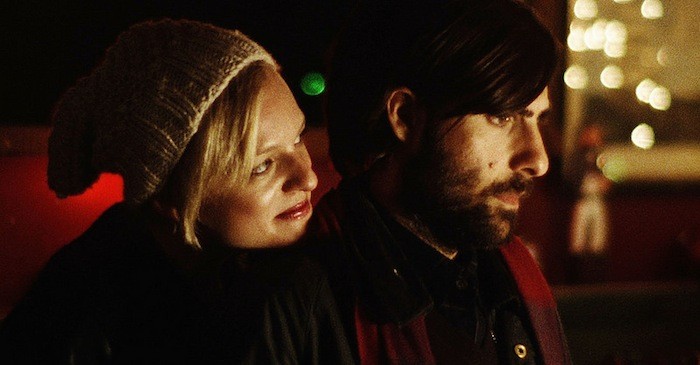VOD film review: Listen Up Philip

Review Overview
Arrogance
8Awkwardness
8Laughs
8Rating
David Farnor | On 06, Jun 2015
Director: Alex Ross Perry
Cast: Jason Schwartzman, Elisabeth Moss, Jonathan Pryce
Certificate: 15
Watch Listen Up Philip online in the UK: BFI Player+ / Apple TV (iTunes) / Prime Video (Buy/Rent) / Curzon Home Cinema / TalkTalk TV / Rakuten TV / Google Play
Jason Schwartzman is one of those guys you love to hate. Whether it’s Rushmore’s prematurely intellectual Max Fischer, Scott Pilgrim’s possessive Gideon or The Darjeeling Limited’s youngest brother, more concerned with his love life than family, he has a gift for making unlikeable people entertaining to watch. His latest character, Philip, is the most unlikeable yet. Fortunately, that means he’s also the most entertaining.
Philip Lewis Friedman, to give him his full name, is a writer. He’s just had his first taste of success, which makes him all the more confident in his own superiority to everyone around him. And so he continues to pursue his calling in life – which mostly seems to be reminding other people how unimportant they are.
Director Alex Ross Perry makes no effort to soften that self-centred nature. We first meet Philip as he takes a copy of his new book to his ex-girlfriend, only to decide not to give it to her anyway and storm out. Then he delivers a “robust dressing down” to his former best friend, only for us to discover that they’re in a wheelchair. It’s a gift of a role for Schwartzman, who manages the impossible task of getting his arms wide enough to embrace his novelist’s ego. It’s a tour de force of douchebaggery: his jackets are tight and constrictive, his eyes are dead and uninterested, and his speech is hilariously abrupt. If you met him in the street, it would only be a matter of time until you punched him in the beard.
Luckily, Listen Up Philip never asks us to sympathise with this despicable human being – something that will be a stumbling block for some viewers, who will simply loathe every second. But fans of Noah Baumbach’s early work will find endless joy in the spikiness on display: it’s like watching Jesse Eisenberg’s character in The Squid and the Whale all grown up. Or, in a bizarre kind of way, like watching a middle-class It’s Always Sunny in Philadelphia, a show that makes a point of not caring for its characters so you can laugh at their follies instead.
When Jonathan Pryce enters as Philip’s idol, the brilliantly named Ike Zimmerman, the barbs become even crueller, as the older author’s spiralling selfishness provides a bleakly funny forecast of his protege’s future. (His bookcase is, wonderfully, full of his own books.) Even a journalist Philip encounters is an ass – “Read an article about me, I’m self-deprecating,” he quips – but in this sea of sickening self-sycophants, and zippy disdain, our author takes top prize.
“Having once known me is all that will be notable about them,” he declares of all those in his life. Schwartzman’s open face gives this monster a childlike quality. Like an infant of six months, he has no sense of object permanence; when people are out of his sight, they cease to exist.
Fortunately, Ross’ script does not have the same problem: halfway through, its focus shifts slightly to his partner, Ashley (Moss), at which point the film moves from diverting to delicious. After years of earning our support as Mad Men’s Peggy, Elisabeth Moss is just as forthright as Philip’s shunned girlfriend, who proves to be his opposite. She, too, is a writer, but she is generous in her success and does not delight in making everyone as miserable as she is. After one row, Philip leaves the room, but Ross’ camera lingers on Ashley’s expression, as it moves between sadness, anger and happiness – a textbook example of how to act with only your face.
The warm, handheld visuals stay intimate, as Ross forces his cast right in your face; a literal warts-and-all approach that recalls the pain (if not the heartbreaking weight and devastation) of Woody Allen’s Husbands and Wives. It means the rest of the supporting ensemble can make their own impact, from Breaking Bad’s Krysten Ritter as Ike’s daughter, who has been sucked into this whirlpool of bitterness for years, to Josephine de La Baume’s Yvette, a teaching colleague of Philip, who only emphasises his inability to connect with other people.
All the while, events are narrated by Eric Bogosian, whose deep voice and knowing comments (accompanied by smoky jazz) dip in and out of his subject’s differing perspectives – a device that adds a pretentious, literary tone to the movie. The end credits are a glorious parade of works published by Friedman and Zimmerman; you can imagine this one fitting right in. The voice-over also keeps us resolutely detached, even as hints of emotion peek through the story’s preening veneer of self-regard – a thick layer that, like its hero, remains obnoxious, awkward and highly, highly amusing. You’ll hate him – and you’ll absolutely love it.
Listen Up Philip is available on BFI Player+, as part of a £4.99 monthly subscription.




















